C++类和对象(中)
@TOC
一、前言
本章是继C++类和对象启点之章的后续,进一步深入学习掌握C++类和对象
二、类的6个默认成员函数汇总
对于任何一个类来说,在我们不主动写默认成员函数时,会自动生成默认成员函数,总共有6个默认成员函数
- 汇总示图:

三、构造函数
- 引入:
在C语言数据结构时,创建结构变量我们经常需要自行调用结构初始化函数,否则可能会报错,为了避免忘记调用初始化函数,C++对此做出了优化,即在创建对象时自动调用初始化函数,也就是构造函数
- 概念:
构造函数是特殊的成员函数,在由类创建对象时对对象的成员变量进行初始化,创建类类型对象时由编译器自动调用,保证每个数据成员都有一个合适的初始值,并且在对象的生命周期内只调用一次
-
特性:
-
函数名必须和类名一致
-
无返回值(没有返回值并不是void,void返回值是空)
-
对象实例化时编译器自动调用对应的构造函数(在C语言上的优化)
-
构造函数可以重载(可以存在多种初始化方式)
-
-
示例:
class Date
{
public:
// 1.无参构造函数
Date()
{
cout << "Date()" << endl;
}
// 2.带参构造函数
Date(int year, int month, int day)
{
cout << "Date(int year, int month, int day)" << endl;
_year = year;
_month = month;
_day = day;
}
private:
int _year;
int _month;
int _day;
};
void TestDate()
{
Date d1; // 调用无参构造函数
Date d2(2022, 2, 1); // 调用带参的构造函数
// 注意:如果通过无参构造函数创建对象时,对象后面不用跟括号,否则就成了函数声明
// 以下代码的函数:声明了d3函数,该函数无参,返回一个日期类型的对象
Date d3();
}
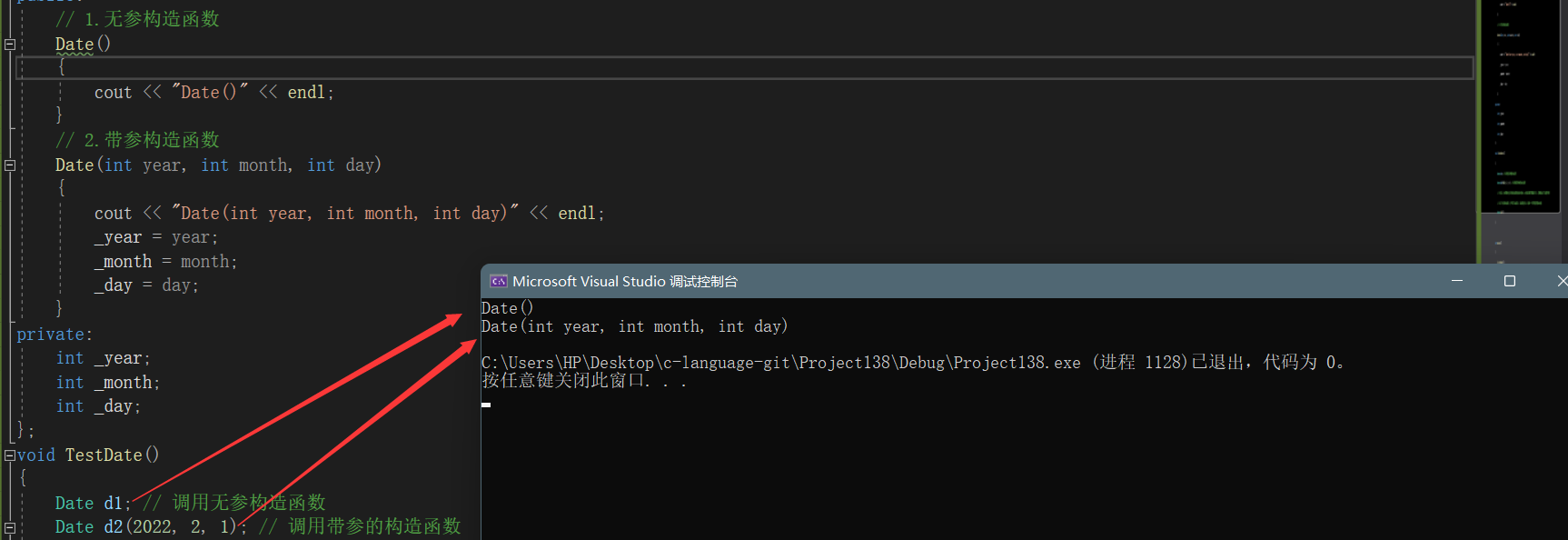
- 如果类中没有显式定义构造函数(我们没有主动写),则C++编译器会自动生成一个无参的默认构造函数,一旦用户显式定义编译器将不再生成
- 示例:
class Date
{
public:
/*
// 如果用户显式定义了构造函数,编译器将不再生成
Date (int year, int month, int day)
{
_year = year;
_month = month;
_day = day;
}
*/
private:
int _year;
int _month;
int _day;
};
void Test()
{
// 没有主动写构造函数,此处会调用编译器生成的默认构造函数
Date d;
}
- 无参的构造函数和全缺省的构造函数都称为默认构造函数,并且默认构造函数只能有一个(默认构造函数:无参构造函数、全缺省构造函数、我们没写编译器默认生成的构造函数)
- 示例:
class Date
{
public:
//构造函数可以重载,因为可能我们想初始化对象的方式有多种
Date()//无参构造函数
{
_year = 1900;
_month = 1;
_day = 1;
}
Date(int year = 1900, int month = 1, int day = 1)//全缺省构造函数
{
_year = year;
_month = month;
_day = day;
}
private:
int _year;
int _month;
int _day;
};
// 以下测试函数能通过编译吗?
void Test()
{
Date d1;
}

- 解释:
对于不传参构造来说,初始化调用无参构造函数或者全缺省构造函数都行,而编译器不能明确知道该调用哪一个(存在二义性/矛盾),也就报错了
- 编译器生成默认的构造函数其实并不会对对象的内置类型(int/char/float等等)进行处理(因为并不知道怎样初始化好),但是会对自定义类型进行调用其类型自身的默认构造函数
- 示例:
class Time
{
public:
Time()//自己写的默认构造函数
{
cout << "Time()" << endl;
_hour = 0;
_minute = 0;
_second = 0;
}
private:
int _hour;
int _minute;
int _second;
};
class Date
{
/*Date()
{
cout << "Date" << endl;
}*/
private:
// 基本类型(内置类型)
int _year;
int _month;
int _day;
// 自定义类型
Time _t;
};
int main()
{
Date d;
return 0;
}

注:如果自定类型的默认构造函数也是编译器默认生成的话,还是相当于不会处理

注:所以一般来说都建议自己写构造函数进行初始化成员变量
- 成员变量的命名风格
对于一般的命名来说在一定的情况中可能或造成命名冲突
- 示例:
class Date
{
public:
Date(int year)
{
// 这里的year到底是成员变量,还是函数形参?指定不明,编译器会根据就近原则选择是函数形参变量
year = year;
}
private:
int year;
};

- 命名风格1:
class Date
{
public:
Date(int year)
{
_year = year;
}
private:
int _year;
};
- 命名风格2:
class Date
{
public:
Date(int year)
{
m_year = year;
}
private:
int m_year;
};
四、析构函数
- 引入:
和构造函数一样,因为一些类型的创建后需要自行释放动态开辟的空间(避免内存泄漏),为了避免忘记,C++也引入了析构函数
- 概念:
析构函数不是完成对象的销毁,局部对象销毁工作是由编译器完成的,而对象在销毁时会自动调用析构函数,完成类的一些资源清理工作(释放动态开辟的空间)
-
特性:
-
析构函数名是在类名前加上字符 ~
-
无参数无返回值
-
一个类有且只有一个析构函数,若未显式定义,系统会自动生成默认的析构函数(不能重载)
-
对象生命周期结束时,C++编译系统系统自动调用析构函数 (在C语言上的优化)
-
-
示例:
typedef int DataType;
class SeqList
{
public:
SeqList(int capacity = 10)//构造函数
{
_pData = (DataType*)malloc(capacity * sizeof(DataType));
assert(_pData);
_size = 0;
_capacity = capacity;
}
~SeqList()//析构函数
{
cout << "~SeqList()" << endl;
if (_pData)
{
free(_pData); // 释放堆上的空间
_pData = NULL; // 将指针置为空
_capacity = 0;
_size = 0;
}
}
private:
int* _pData;
size_t _size;
size_t _capacity;
};
int main()
{
SeqList sl;
return 0;
}

- 对于编译器生成的默认析构函数,对于内置类型不用处理(对象生命周期结束会自动销毁),对自定类型成员调用它的析构函数
注:一般来说如果成员变量没有动态开辟的空间,可以不用自己写,编译器自动生成的就足够用
- 示例:
class String
{
public:
String(const char* str = "jack")
{
_str = (char*)malloc(strlen(str) + 1);
strcpy(_str, str);
}
~String()
{
cout << "~String()" << endl;
free(_str);
}
private:
char* _str;
};
class Person
{
private:
String _name;
int _age;
};
int main()
{
Person p;
return 0;
}

五、拷贝构造函数
- 概念:
在创建对象时,创建一个与一个对象一某一样的新对象
只有单个形参,该形参是对本 类类型对象的引用**(一般常用const**修饰),在用已存在的类类型对象创建新对象时由编译器自动调用
-
特征:
-
拷贝构造函数是构造函数的一个重载形式(参数不同)
-
拷贝构造函数的参数只有一个且必须使用引用传参,使用传值方式会引发无穷递归调用(传值也是一种拷贝,会继续调用拷贝函数)
-
-
示例:
class Date
{
public:
Date(int year = 1900, int month = 1, int day = 1)//构造函数
{
_year = year;
_month = month;
_day = day;
}
Date(const Date& d)//拷贝构造函函数
{
_year = d._year;
_month = d._month;
_day = d._day;
}
private:
int _year;
int _month;
int _day;
};
int main()
{
Date d1;//调用构造函数
Date d2(d1);//调用拷贝构造函数
return 0;
}
- 传值拷贝构造:
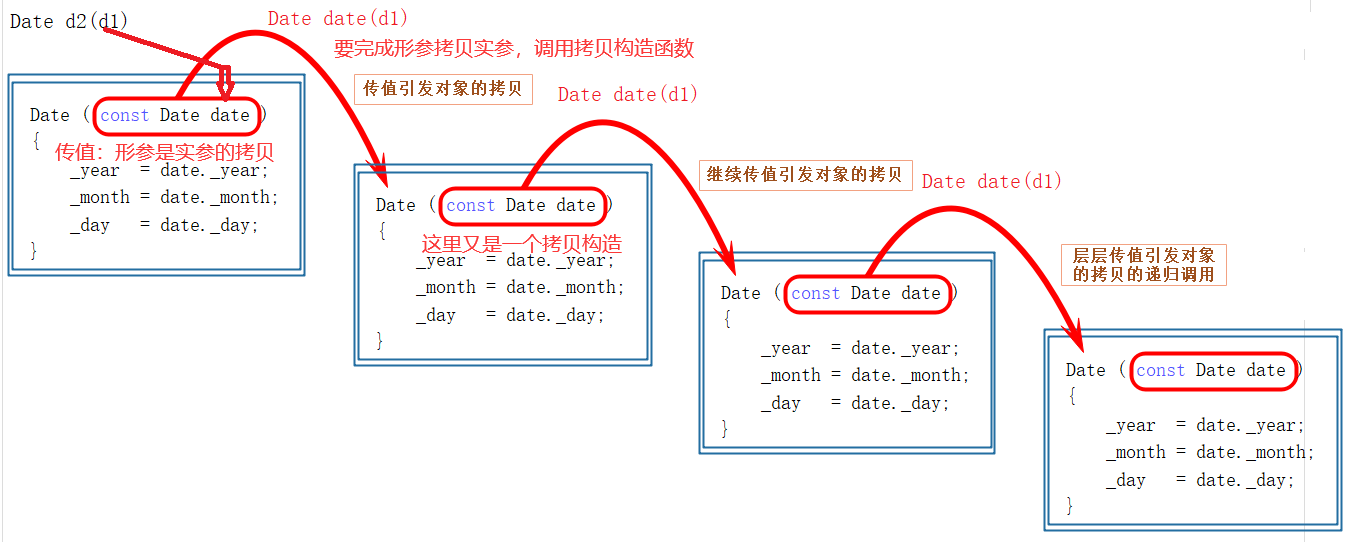
- 若未显示定义,系统生成默认的拷贝构造函数。 默认的拷贝构造函数对象按内存存储按字节序完成拷贝,这种拷贝我们叫做浅拷贝,或者值拷贝
class Date
{
public:
Date(int year = 1900, int month = 1, int day = 1)
{
_year = year;
_month = month;
_day = day;
}
private:
int _year;
int _month;
int _day;
};
int main()
{
Date d1;
// 这里d2调用的默认拷贝构造完成拷贝,d2和d1的值也是一样的。
Date d2(d1);
return 0;
}
- 编译器生成的默认拷贝构造函数已经可以完成字节序的值拷贝了,对于像日期类这样的类(只有指针类型的类)是没必要的,编译器生成的足够使用了,而对于存在指针类型的成员函数则会存现问题
class String
{
public:
String(const char* str = "xxxx")
{
_str = (char*)malloc(strlen(str) + 1);
strcpy(_str, str);
}
~String()//析构函数,进行释放动态开辟的空间
{
cout << "~String()" << endl;
free(_str);
}
private:
char* _str;
};
int main()
{
String s1("hello");
String s2(s1);
}
- 解释:
当两个同类对象的成员指针变量同时指向一个动态开辟的空间,如果一个对象对这空间进行释放,而另一个对象却依旧保存着该地址(野指针),如果进行操作该空间(再次free等)则会造成程序崩溃
六、赋值运算符重载
1、运算符重载
- 引入:
C++为了增强代码的可读性引入了运算符重载,运算符重载是具有特殊函数名的函数,也具有其返回值类型,函数名字以及参数列表,其返回值类型与参数列表与普通的函数类似
- 使用:
- 函数名字:关键字operator后面接需要重载的运算符符号
- 函数原型:返回值类型 operator操作符(参数列表)
-
注意:
-
不能通过连接其他符号来创建新的操作符,如@等
-
重载操作符必须有一个类类型或者枚举类型的操作数
-
.* 、:: 、sizeof 、?: 、. 注意以上5个运算符不能重载
-
如果重载函数在类外,想要访问类里的成员变量,有两种方式
-
-
方式1:设置成员变量访问限定符为public
class Date
{
public:
Date(int year = 1900, int month = 1, int day = 1)
{
_year = year;
_month = month;
_day = day;
}
//private:
int _year;
int _month;
int _day;
};
// 成员变量是共有的,封装性无法保证
bool operator==(const Date& d1, const Date& d2)
{
return d1._year == d2._year
&& d1._month == d2._month
&& d1._day == d2._day;
}
void Test()
{
Date d1(2018, 9, 26);
Date d2(2018, 9, 27);
cout << (d1 == d2) << endl;
}
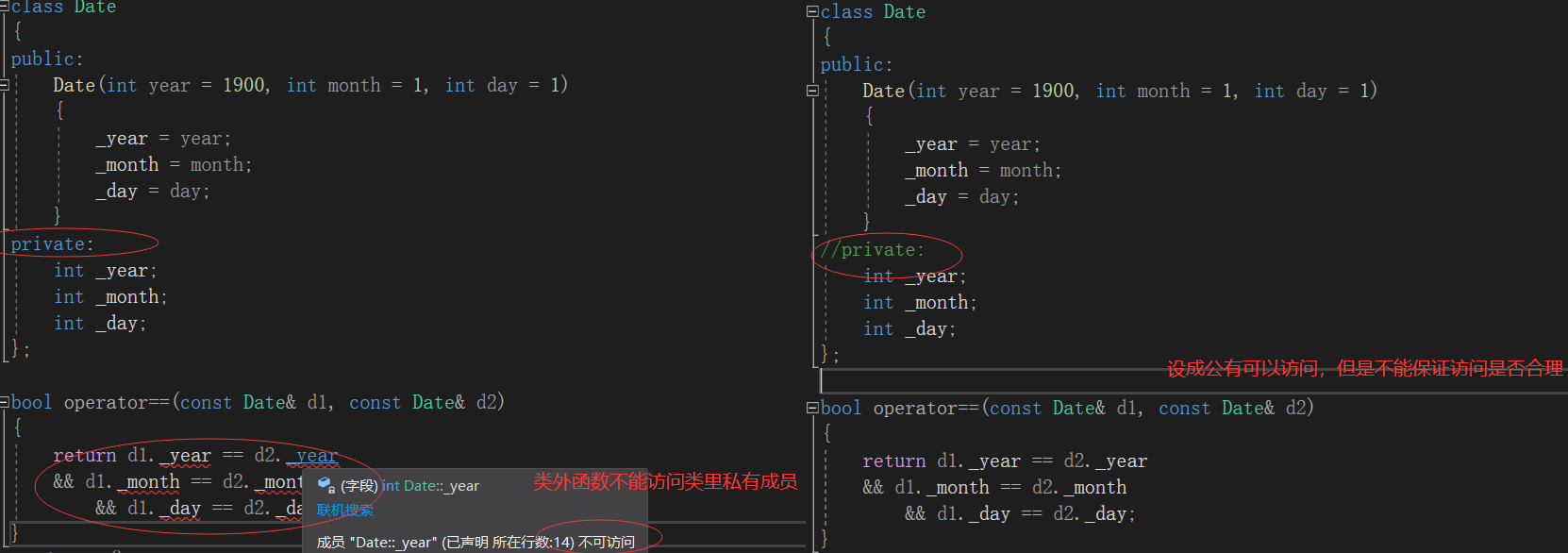
- 方式2:设置成友元函数
对于友元的知识在类和对象最终章会详细讲解,这里只做了解
注:一般来说都建议将操作符重载设定在类里面(重载成成员函数)
-
用于内置类型的操作符,其含义不能改变,例如:内置的整型+,不能改变其含义
-
作为类成员的重载函数时,其形参看起来比操作数数目少1成员函数,但是操作符函数有一个默认的形参this,限定为第一个形参(注:对于两个操作数的操作符,第一个形参代表左操作数,第二个形参代表右操作数)
- 示例:
class Date
{
public:
Date(int year = 1900, int month = 1, int day = 1)
{
_year = year;
_month = month;
_day = day;
}
// bool operator==(Date* this, const Date& d2)
// 这里需要注意的是,左操作数是this指向的调用函数的对象
bool operator==(const Date& d2)
{
return _year == d2._year
&& _month == d2._month
&& _day == d2._day;
}
private:
int _year;
int _month;
int _day;
};
void Test()
{
Date d1(2018, 9, 26);
Date d2(2018, 9, 27);
cout << (d1 == d2) << endl;
}
2、赋值运算符重载
- 示例:Date类赋值运算符重载
class Date
{
public:
Date(int year = 1900, int month = 1, int day = 1)
{
_year = year;
_month = month;
_day = day;
}
Date(const Date& d)
{
_year = d._year;
_month = d._month;
_day = d._day;
}
Date& operator=(const Date& d)
{
if (this != &d)//避免对象赋值自己
{
_year = d._year;
_month = d._month;
_day = d._day;
}
}
private:
int _year;
int _month;
int _day;
};
int main()
{
Date d1(2022,2,1);//调用构造函数
Date d2;
d2=d1;//调用赋值操作符重载
return 0;
}

- 赋值运算符主要有四点:
参数类型
返回值
检测是否自己给自己赋值
返回*this
一个类如果没有显式定义赋值运算符重载,编译器也会生成一个,完成对象按字节序的值拷贝
- 注意:
对于赋值重载和拷贝构造其实本质上作用差不多,唯一一点的区别是赋值重载是在对象创建之后进行赋值操作,而拷贝构造是在对象创建时进行初始化
和拷贝构造一样,如果对于像Date类一样的类来说,编译器默认生成的赋值重载已经足够完成成员变量的浅拷贝任务了,不需要自己写,如果涉及深拷贝则需要自己写
七、日期类的实现
在以目前学会的类和对象知识,我们可以上手实现一个Date类出来
- 接口展示:
class Date
{
public:
// 获取某年某月的天数
int GetMonthDay(int year, int month);
// 全缺省的构造函数
Date(int year = 1900, int month = 1, int day = 1);
// 拷贝构造函数
// d2(d1)
Date(const Date& d);
// 赋值运算符重载
// d2 = d3 -> d2.operator=(&d2, d3)
Date& operator=(const Date& d);
// 析构函数
~Date();
// 日期+=天数
Date& operator+=(int day);
// 日期+天数
Date operator+(int day);
// 日期-天数
Date operator-(int day);
// 日期-=天数
Date & operator-=(int day);
// 前置++
Date& operator++();
// 后置++
Date operator++(int);
// 后置--
Date operator--(int);
// 前置--
Date& operator--();
// >运算符重载
bool operator>(const Date& d);
// ==运算符重载
bool operator==(const Date& d);
// >=运算符重载
inline bool operator >= (const Date& d);
// <运算符重载
bool operator < (const Date& d);
// <=运算符重载
bool operator <= (const Date& d);
// !=运算符重载
bool operator != (const Date& d);
// 日期-日期 返回天数
int operator-(const Date& d);
private:
int _year;
int _month;
int _day;
};
八、const成员
- const修饰类的成员函数
将const修饰的类成员函数称之为const成员函数,const修饰类成员函数,实际修饰该成员函数隐含的this指针,表明在该成员函数中不能对类的任何成员进行修改
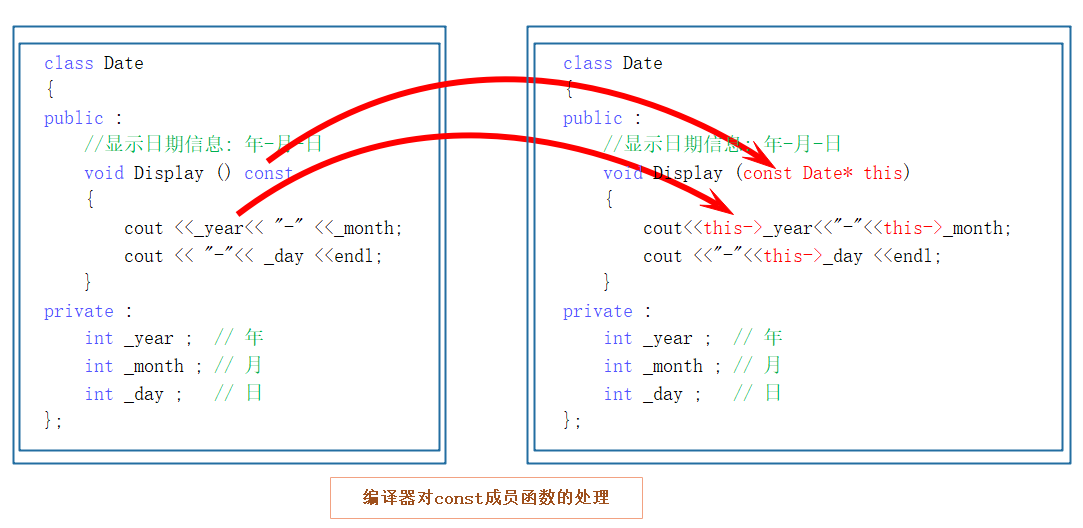
- 相关问题:
class Date
{
public:
void Display()
{
cout << "Display ()" << endl;
cout << "year:" << _year << endl;
cout << "month:" << _month << endl;
cout << "day:" << _day << endl << endl;
}
void Display() const
{
cout << "Display () const" << endl;
cout << "year:" << _year << endl;
cout << "month:" << _month << endl;
cout << "day:" << _day << endl << endl;
}
private:
int _year; // 年
int _month; // 月
int _day; // 日
};
void Test()
{
Date d1;
d1.Display();
const Date d2;
d2.Display();
}
- const对象可以调用非const成员函数吗?
不能,const对象即不能修改,而非const成员函数则需要对象能可读可写(权限的扩大)
- 非const对象可以调用const成员函数吗?
能,非const对象即是可读可写,调用const成员函数则只需要对象能可读就行(权限的缩小)
- const成员函数内可以调用其它的非const成员函数吗?
不能,const成员函数即无法通过this修改对象不能修改,而非const成员函数则需要对象能可读可写(权限的扩大)
- 非const成员函数内可以调用其它的const成员函数吗
能,非const成员函数即能通过this修改对象可读可写,调用const成员函数则只需要对象能可读就行(权限的缩小)
九、取地址及const取地址操作符重载
这两个默认成员函数一般不用重新定义 ,编译器默认会生成
class Date
{
public:
Date* operator&()
{
return this;
}
const Date* operator&()const
{
return this;
}
private:
int _year; // 年
int _month; // 月
int _day; // 日
};
这两个运算符一般不需要重载,使用编译器生成的默认取地址的重载即可,只有特殊情况,才需要重载,比如想让别人获取到指定的内容(不想让别人找到对象地址)!
- 点赞
- 收藏
- 关注作者

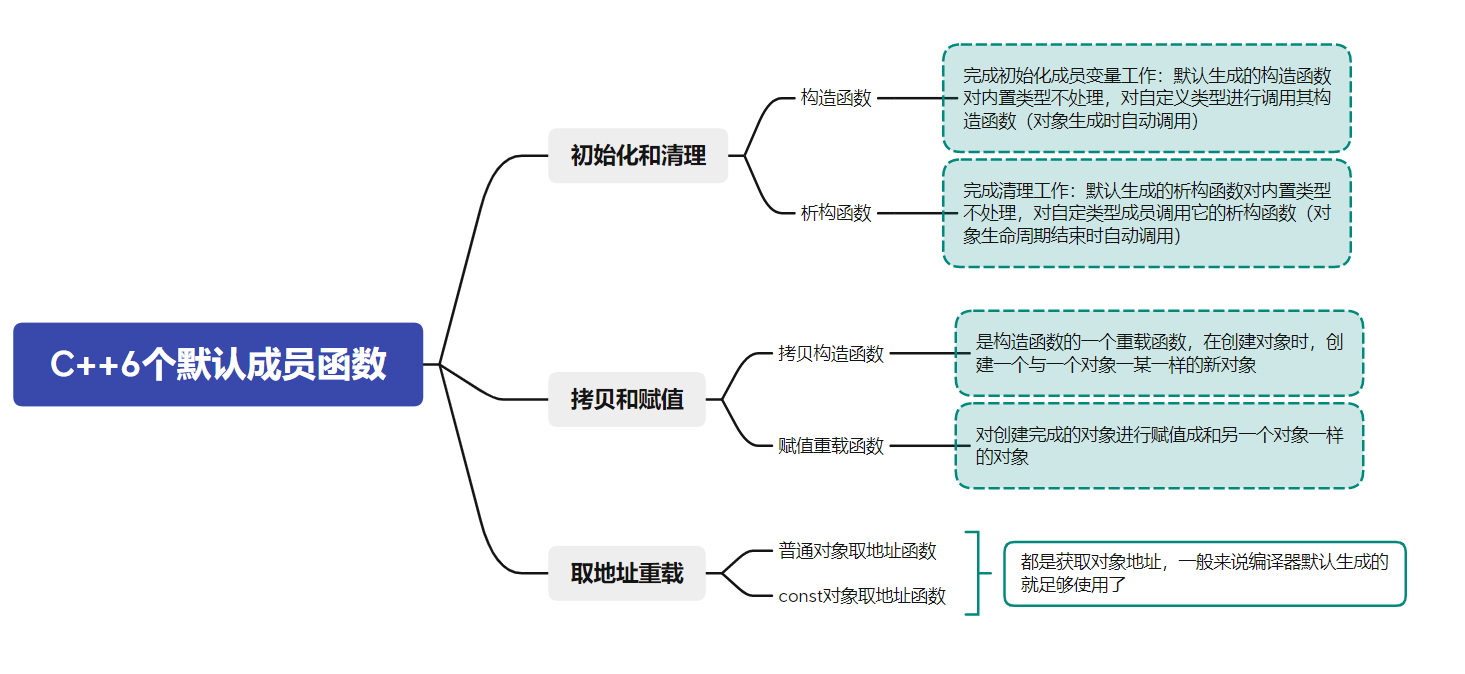
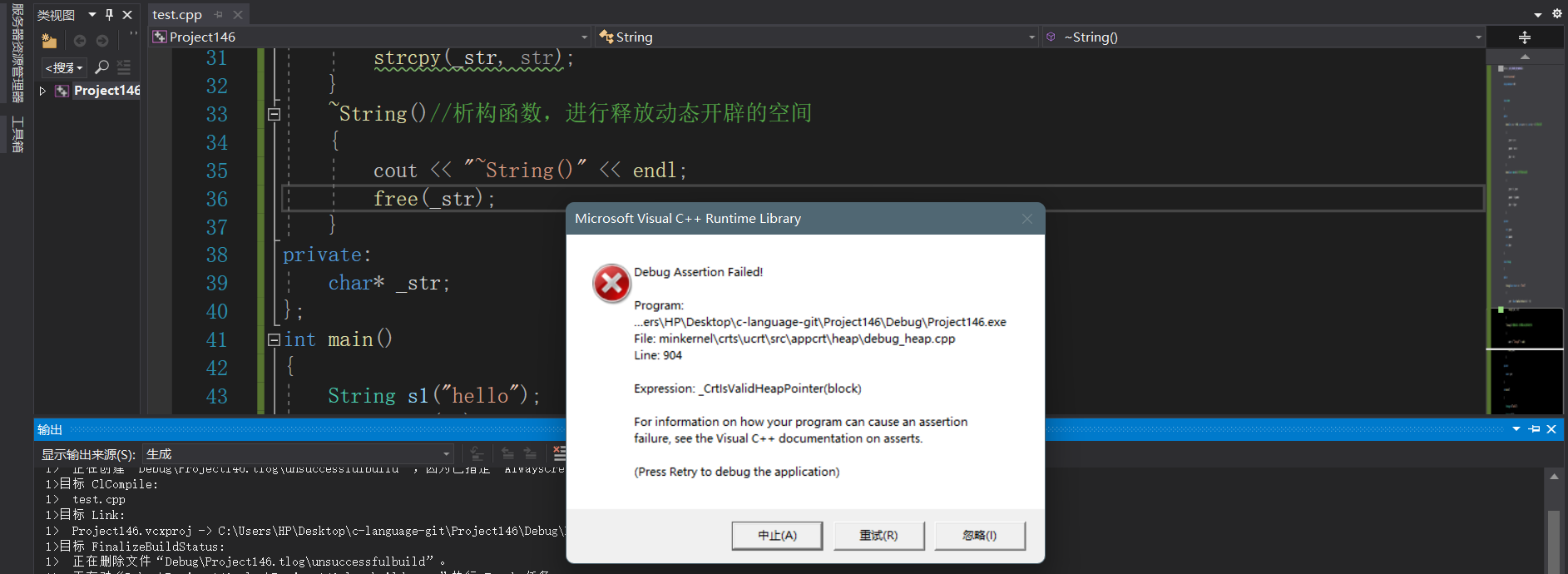

评论(0)